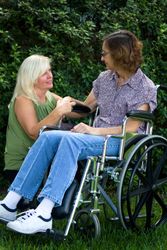Understanding Dyskinesia and Treatment Options

If you or a loved one has recently been diagnosed with Parkinson’s disease, it’s important to educate yourself on the different symptoms that can accompany this condition. From speech and writing changes to dyskinesia, understanding what to expect can better help you manage this disease. If you think you’re experiencing dyskinesia, learn more about its symptoms and methods of treatment below.
What Is Dyskinesia?
Dyskinesia refers to uncontrollable spasms or movements of the face, limbs, or trunk of the body. They often appear as fluid, smooth motions, but they can become extended spasms with rapid jerking and writhing. Dyskinesia can range from mild, barely noticeable movements to severe, involuntary motions that interfere with day-to-day life.
What Causes It?
 Dyskinesia isn’t a specific symptom of Parkinson’s disease; rather, it’s a complication that can develop from the medication one takes to manage the condition. Peak-dose dyskinesias are the most common and develop one to two hours after taking the medication, when the concentration of levodopa is at the highest. These are typically mild movements that you may be unaware of. Diphasic dyskinesia is common with low doses of levodopa and can cause more severe, jerking movements, but it can typically be improved with an increased dose of medication.
Dyskinesia isn’t a specific symptom of Parkinson’s disease; rather, it’s a complication that can develop from the medication one takes to manage the condition. Peak-dose dyskinesias are the most common and develop one to two hours after taking the medication, when the concentration of levodopa is at the highest. These are typically mild movements that you may be unaware of. Diphasic dyskinesia is common with low doses of levodopa and can cause more severe, jerking movements, but it can typically be improved with an increased dose of medication.
How to Manage Dyskinesia
The most consistent way to treat the movements caused by dyskinesia is to take the right dose of medication to help control your symptoms without taking a concentration so high that you experience side effects. Your doctor will work closely with you to determine the best methods for combating the condition. This may include adjusting the amount of medication you are taking as well as when you take it. Additionally, amantadine is a drug that is available in regular and extended-release formulations and can help reduce the erratic movements during low-dose periods.
If you are looking for more ways to better cope with and understand Parkinson’s disease and all the symptoms that come with it, find support with Connecticut Advocates for Parkinson's (CAP). This non-profit charity offers invaluable resources to individuals and families experiencing this disease, including monthly support group meetings and outreach initiatives. To learn more about this team of volunteers, visit them online or call (860) 266-6040.
About the Business
Have a question? Ask the experts!
Send your question

